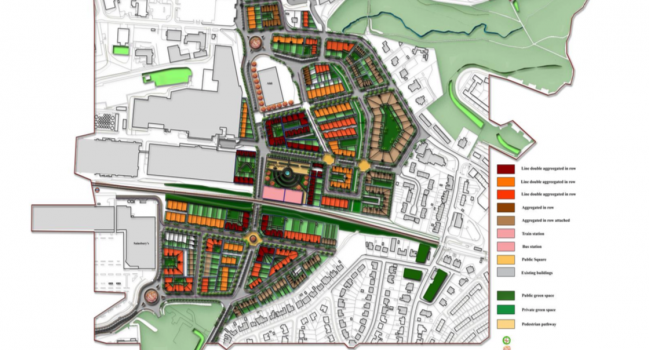The accompanying work is the culmination of months of investigation on Drumchapel to produce an urban development masterplan vision for its future.
We’re seeking to address the essential pitfalls of the large-scale building programme of Drumchapel
with this masterplan. Drumchapel is a run-down and neglected neighbourhood which has reinforced negative attitudes, undermined local confidence,
and generated unpopularity and low demand.
This masterplan is therefore the means of drawing together a clear strategy for the physical, economic and social transformation of a neighbourhood to address regeneration in a comprehensive and systematic way. It is a coherent process of planning for change in the physical, economic and social fabric of an area, to be achieved through the joint input and efforts of professionals and the local community. It involves continual dialogue between those setting the parameters of the plans and the representatives of the communities affected by them. Master planning also needs to shuttle continually from the long–term and strategic issues to more immediate and localised concerns. The plan itself undergoes a process of constant readjustment and refinement.
This research was conducted in phases; Analysis, Strategy, Framework and Coding and Masterplan.
The analysis stage concentrated on understanding Drumchapel’s physical form, its history and the stories of its inhabitants. It mapped the area and looked at the subjective view of the place. It looked at Glasgow City Council’s vision for Drumchapel. It examined the nodes in the area, density, street network and its associations with Glasgow as a whole.
On the strategy phase we united every one of the parts of the past stage to shape a key way to deal with redeveloping Drumchapel, concentrating on key aspirations and thinking about long haul term objectives. Identify the capability of the area for development. Helping to stitch new development seamlessly into an existing community and its heritage.
Engaging the local community in thinking about their role in a development of regeneration process. Promote the area and market it in the process of regeneration. Attracting private sector investment in the area.
The interventions in this masterplan will be phased out over a long period between 20-25 years.
Mrunal Navandar, Keith Luke, Ngalazu Phiri


